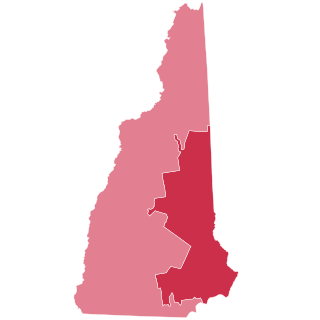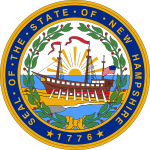
The General Court of New Hampshire is the bicameral state legislature of the U.S. state of New Hampshire. The lower house is the New Hampshire House of Representatives with 400 members, and the upper house is the New Hampshire Senate with 24 members. This ratio of one Senate seat for every 16.67 House seats makes New Hampshire's ratio of upper house to lower house seats the largest in the country.
These are tables of congressional delegations from New Hampshire to the United States Senate and United States House of Representatives.

The 1988 United States House of Representatives elections was an election for the United States House of Representatives on November 8, 1988, to elect members to serve in the 101st United States Congress. They coincided with the election of George H. W. Bush as president. Although Bush won with a strong majority, his Republican Party lost a net of two seats to the Democratic Party, slightly increasing the Democratic majority in the House. It was the first time since 1960 that an incoming president's party lost seats in the House.

The New Hampshire House of Representatives is the lower house in the New Hampshire General Court, the bicameral legislature of the state of New Hampshire. The House of Representatives consists of 400 members coming from 203 legislative districts across the state, created from divisions of the state's counties. On average, each legislator represents about 3,300 residents, which is the smallest state legislative population-to-representative ratio in the country.

Elections in the U.S. state of New Hampshire are held at national, state and local level. The state holds the first presidential primary in the national cycle. Elections for a range of state positions coincide with biennial elections for the House of Representatives.

The 2010 congressional elections in New Hampshire were held on November 2, 2010, to determine who will represent the state of New Hampshire in the United States House of Representatives. It coincided with the state's senatorial and gubernatorial elections. Representatives are elected for two-year terms; those elected served in the 112th Congress from January 2011 until January 2013.

The 2002 congressional elections in New Hampshire were held on November 5, 2002, to determine who would represent the state of New Hampshire in the United States House of Representatives. It coincided with the state's senatorial elections. Representatives are elected for two-year terms; those elected served in the 108th Congress from January 2003 until January 2005. New Hampshire has two seats in the House, apportioned according to the 2000 United States census.

Three of the four New Hampshire incumbents were re-elected.

New Hampshire elected its members August 26, 1822. New Hampshire law required a candidate to receive votes from a majority of voters for election, that is 1/12 of votes. Only five candidates received the requisite majority, and so a May 11, 1823 run-off election was held for the sixth seat.

New Hampshire increased its apportionment from 4 seats to 5 after the 1800 census.
A special election was held in New Hampshire's at-large congressional district on August 25, 1800, to fill a vacancy left by William Gordon (F) resigning to accept an appointment as New Hampshire Attorney General on June 12, 1800.

New Hampshire elected its members between November 1, 1824 and March 8, 1825. New Hampshire law required candidates to receive votes from a majority of voters for election. As only five candidates received votes from a majority of voters, a run-off election had to be held for the sixth seat on March 8, 1825.

The 2004 congressional elections in New Hampshire were held on November 2, 2004, to determine who will represent the state of New Hampshire in the United States House of Representatives. It coincided with the state's senatorial and gubernatorial elections. Representatives are elected for two-year terms; those elected served in the 109th Congress from January 2005 until January 2007. New Hampshire has two seats in the House, apportioned according to the 2000 United States census.

The 2000 congressional elections in New Hampshire were held on November 7, 2000, to determine who will represent the state of New Hampshire in the United States House of Representatives. It coincided with the state's gubernatorial elections. Representatives are elected for two-year terms; those elected served in the 107th Congress from January 2001 until January 2003. New Hampshire has two seats in the House, apportioned according to the 2000 United States census.

The 1992 congressional elections in New Hampshire were held on November 3, 1992. They determined who would represent the state of New Hampshire in the United States House of Representatives. Representatives are elected for two-year terms; those elected served in the 103rd Congress from January 1993 until January 1995. New Hampshire has two seats in the House, apportioned according to the 1990 United States census.

The 2016 United States House of Representatives elections in New Hampshire were held on November 8, 2016, to elect the two U.S. representatives from the state of New Hampshire, one from each of the state's two congressional districts. The elections coincided with the 2016 U.S. presidential election, as well as other elections to the House of Representatives, elections to the United States Senate and various state and local elections. The primaries were held on September 13.

New Hampshire state elections in 2018 were held on Tuesday, November 6, 2018, with the primary elections being held on June 5, 2018. Voters elected 2 members to the United States House of Representatives, the Governor of New Hampshire, all five members to the Executive Council, all 24 members to the New Hampshire Senate, and all 400 members to the New Hampshire House of Representatives, among other local elected offices.

New Hampshire state elections in 2016 were held on Tuesday, November 8, 2016. Voters elected 4 electors in the electoral college for President of the United States, one Senator in the United States Senate, 2 members to the United States House of Representatives, the Governor of New Hampshire, all five members to the Executive Council, all 24 members to the New Hampshire Senate, and all 400 members to the New Hampshire House of Representatives, among other local elected offices. The Democratic and Republican presidential primary were held on February 9, 2016, and the primary elections for all others offices were held on September 13, 2016.

The 2022 United States House of Representatives elections in New Hampshire were held on November 8, 2022, to elect the two U.S. representatives from the state of New Hampshire, one from each of the state's two congressional districts.








